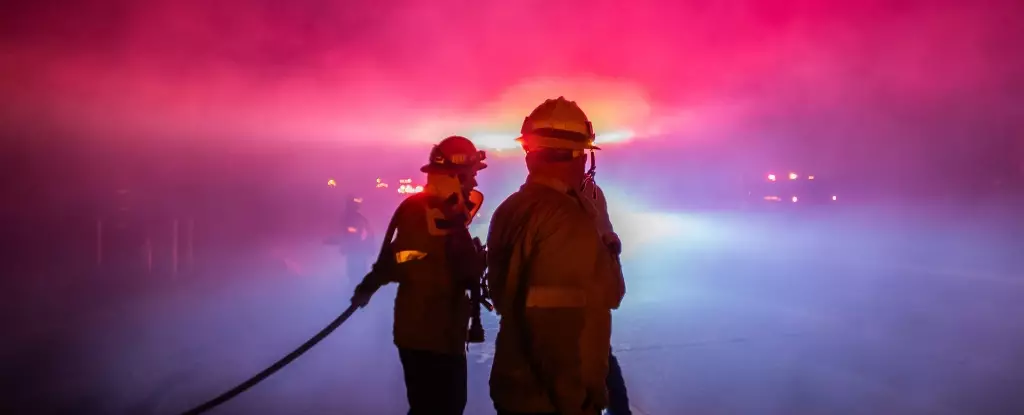The tranquil coastal community of Malibu is currently grappling with the frightening reality of a rapidly spreading wildfire. The Franklin fire, which ignited late Monday, has wreaked havoc, prompting thousands to evacuate, including numerous high-profile figures from the entertainment industry. With at least seven homes reported destroyed, this unfolding disaster highlights the precarious balance between nature and human habitation in one of California’s most exclusive regions.
As gusty winds forced the fire to push westward, firefighters engaged in a fierce battle to protect what they could. A staggering 4,000 acres have already been consumed by the flames, a chilling reminder of the destructive power inherent to wildfires. The fire’s origin point above Pepperdine University has turned what was once a picturesque setting into an emergency zone, as students were herded into fire-resistant shelters. This distressing scene served as stark visual documentation of the threat the wildfire poses to both infrastructure and individuals.
Los Angeles County’s fire chief, Anthony Marrone, conveyed a cautious optimism in a press briefing, indicating that firefighting efforts have yielded a degree of containment. While progress has been made on the eastern and northern flanks of the fire, the situation remains dire, particularly on the western front, which continued to escalate overnight. With meteorologists issuing a Red Flag Warning, the community’s safety hangs in the balance as weather conditions evolve, characterized by strong winds and dangerously low humidity.
Sheriff Robert Luna reported that approximately 20,000 residents were advised to evacuate their homes, a feat made possible through proactive door-to-door communication by local authorities. This early intervention underscores the importance of prompt action during such emergencies. Among those affected, actor Dick Van Dyke, who is approaching his 99th birthday, took to social media to share his experiences. He expressed relief over his successful evacuation, though he faced the heartbreaking uncertainty of leaving behind a beloved pet.
The relentless blaze has not only forced residents to abandon their homes but has also created widespread logistical challenges. Power outages affected significant portions of Malibu, hindering efforts to communicate vital information to those still in the community. As the flames continue their destructive march, around 1,500 firefighters are deployed, utilizing aerial support to contain and suppress the fire’s progress. Their resilience and commitment are commendable, but the sheer scale of the fire presents an overwhelming challenge.
Historically, wildfires have become a recurring issue in California, particularly exacerbated by the atmospheric conditions characteristic of this season. The infamous Santa Ana winds exacerbate already precarious situations, carrying dry air that promotes fire spread. Moreover, climate change is now an undeniable factor, as it is altering traditional weather patterns and prolonging dry spells, which in turn escalate the probability of catastrophic fires.
This situation isn’t merely a localized crisis; it encapsulates broader environmental concerns and policy mishaps. Decades of land management practices aimed at eliminating wildfires have led to an accumulation of combustible materials in many regions. This intentional suppression has resulted in a hazardous environment that, upon ignition, produces fires that behave with unprecedented intensity.
Scientists have repeatedly warned about the consequences of humanity’s reliance on fossil fuels, linking such behaviors directly to climate change. As California faces increasingly frequent wildfire seasons, communities like Malibu serve as a microcosm of the larger issues at play. The stark juxtaposition of natural beauty and human vulnerability remains at the forefront of this ongoing battle.
As Malibu confronts the immediate aftermath of the Franklin fire, the community’s resilience will undoubtedly be tested. The coming days will reveal not just the extent of the physical damage but also the spirit of those forced to navigate this adversity. Support and solidarity among residents, local leaders, and emergency services will be pivotal. However, as we reflect on this catastrophe, a more significant discourse on responsible land management and climate action must emerge to mitigate future risks. The lessons learned today will be fundamental in shaping a safer, more sustainable tomorrow for Malibu and its inhabitants.

